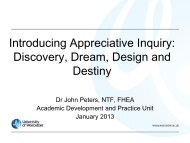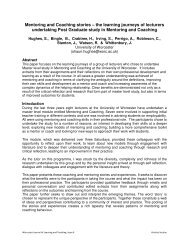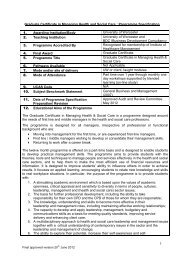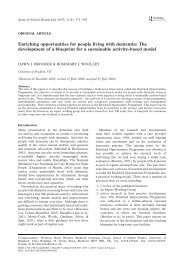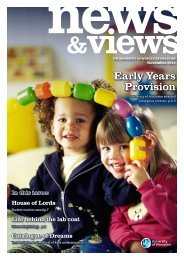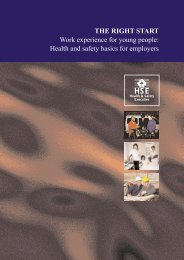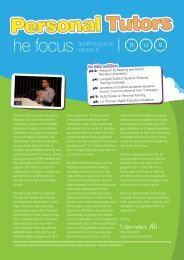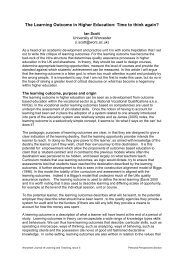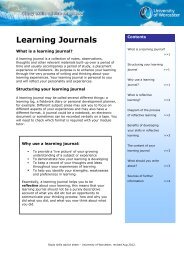BSc (Hons) Midwifery - University of Worcester
BSc (Hons) Midwifery - University of Worcester
BSc (Hons) Midwifery - University of Worcester
Create successful ePaper yourself
Turn your PDF publications into a flip-book with our unique Google optimized e-Paper software.
Status: Confirmed version: 1<br />
Learning, Teaching and Assessment Strategy<br />
The philosophy which drives this programme’s learning, teaching and assessment<br />
methods is firmly rooted in the belief that every student should be enabled to<br />
maximise their learning potential through a variety <strong>of</strong> stimulating inclusive learning<br />
and teaching opportunities. The programme seeks to fully integrate theory and<br />
practice therefore each module has been designed to reflect this integration.<br />
The course team seeks to provide an inclusive, supportive and flexible learning<br />
environment in which e-learning is integrated fully. The aim is to provide “blended<br />
learning” opportunities where students can enjoy and access a range <strong>of</strong> teaching and<br />
learning methods, which utilize both online and face -to -face activities successfully.<br />
All modules <strong>of</strong>fered in this programme include both formal, summative and an<br />
informal, formative assessment; this process is also mirrored in the assessment <strong>of</strong><br />
clinical practice.<br />
<strong>University</strong> based learning<br />
A variety <strong>of</strong> learning and teaching strategies will be employed affording the<br />
students the opportunity to progress from supported learning in the first year to<br />
independent learning in the third year and beyond. These include a combination<br />
<strong>of</strong> traditional approaches such as lead lectures, and skills workshops and active<br />
learner-centred approaches such as problem/scenario based learning, directed<br />
and independent study sessions and debates.<br />
Practical simulations are used in the delivery <strong>of</strong> many aspects <strong>of</strong> the programme.<br />
This method is particularly relevant when teaching clinical skills where students<br />
are exposed to practice situations in realistic clinical skills rooms within the<br />
<strong>University</strong>. This approach encourages students to engage with the reality <strong>of</strong><br />
potential clinical events facilitating the development <strong>of</strong> decision-making, critical<br />
thinking and communication skills. Students are required to sign a consent form<br />
upon commencement <strong>of</strong> the course agreeing to participate in practical simulations,<br />
video and audio recordings.<br />
Students are encouraged to develop the skills <strong>of</strong> autonomous, critical and<br />
analytical thinking with the overall aim <strong>of</strong> emerging as reflective, reflexive lifelong<br />
learners.<br />
Inter-pr<strong>of</strong>essional and Shared Learning (IPL)<br />
The curriculum planning team acknowledge the importance <strong>of</strong> <strong>of</strong>fering<br />
opportunities where learning can be shared with other pr<strong>of</strong>essional groups.<br />
The proposed strategy to increase opportunities for IPL includes increasing<br />
learning opportunities with students studying on the following courses:<br />
<br />
<br />
Pre-Hospital, Unscheduled & Emergency Care FdSc<br />
Diploma in Higher Education, Nursing (Child, Mental Health and Adult branches<br />
and Graduate Diploma students)<br />
Created on: 2 August 2011<br />
Author: TD<br />
3



